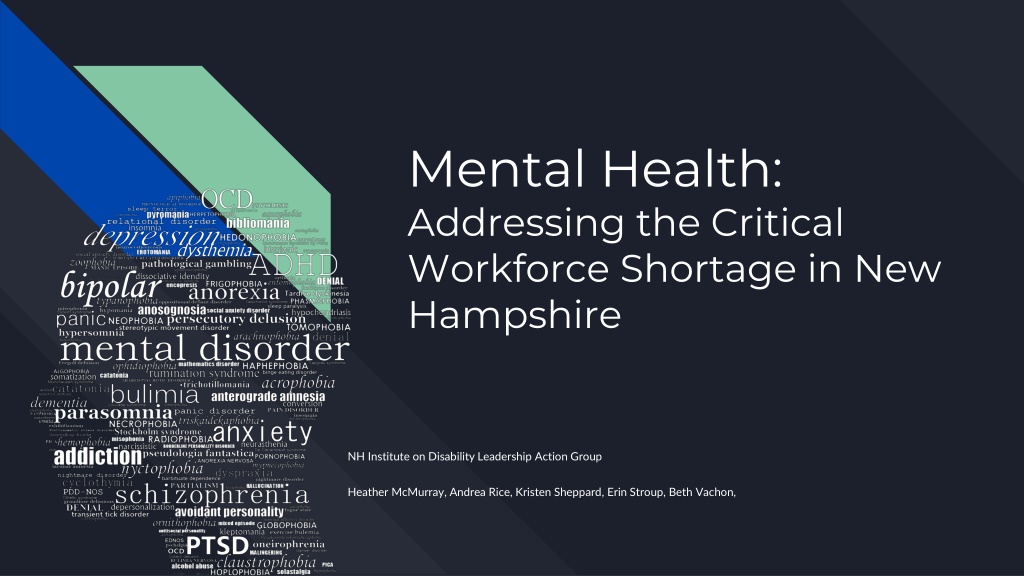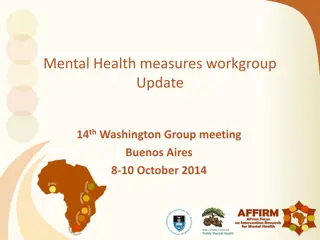Addressing Mental Health Workforce Shortage in New Hampshire
New Hampshire is facing a critical shortage of mental health workers, impacting businesses and services. The demand for mental health services has surged post-pandemic, with a significant gap in wages for community mental health clinicians. Efforts to meet the rising demand include opening new beds and enhancing Rapid Response Teams. However, additional funding is essential to create a well-funded mental health system that can cater to residents in need, especially those with financial constraints. Personal stories reflect the urgency of addressing these challenges.
Download Presentation

Please find below an Image/Link to download the presentation.
The content on the website is provided AS IS for your information and personal use only. It may not be sold, licensed, or shared on other websites without obtaining consent from the author. Download presentation by click this link. If you encounter any issues during the download, it is possible that the publisher has removed the file from their server.
E N D
Presentation Transcript
Mental Health: Addressing the Critical Workforce Shortage in New Hampshire NH Institute on Disability Leadership Action Group Heather McMurray, Andrea Rice, Kristen Sheppard, Erin Stroup, Beth Vachon,
Investing in Mental Health Understanding the Mental Health Workforce Shortage https://youtu.be/4pYubPXua20 The Mental Health Workforce Shortage is a problem affecting ALL New Hampshire Businesses A 2022 survey of businesses by the NH Businesses for Social Responsibility revealed mental health as a high priority for businesses that are losing workers Businesses from all sectors identified two top priorities for mental health in the workplace: A spotlight on mental health in the workplace Resources and Access to Mental Health experts and programs for employees
Meeting the Demand for Services There was a shortage of mental health workers across the nation before the COVID 19 pandemic. Post-pandemic, The demand for services increased at least 20%. NH has services for teens in crisis. There just aren't enough. The 10 NH Community Mental Health Centers (CMHCs) serve a majority of low-income, Medicaid-eligible clients, and have done a commendable job meeting the rising demand for services in the midst of the state mental health crisis. The patients they serve are often the most in need, and seek help from the centers when their mental health issues become emergencies. With help from the NH Legislature, and increased funding two years ago, the Community Mental Health System has opened 60 new beds, and Rapid Response Teams are addressing the needs of NH residents, communities. These teams are diverting people in crisis from Emergency Rooms. However, more funding is needed to address the mental health crisis. New Hampshire deserves an adequately funded mental health system to meet the needs of its residents- especially those who cannot afford private insurance or to pay for services.
Understanding the Wage Gap Primarily funded through Medicaid reimbursements (60-90% of their operating budgets), CMHCs cannot compete with wages offered by other mental health providers. There is an approximate $26-28 million dollar wage gap to bring CMHC employee wages to the level of other providers. A community mental health clinician has an average caseload of 45-50 patients, and can see more than 100 patients per year. Every staff vacancy represents 100 patients that could be receiving help.
Kristen Sheppards Personal Story In 2022, my son was brought to an emergency room on five different occasions, while struggling with first episodes of psychosis. times to emergency rooms, my son waited for a total of 2 months. The longest wait time was 30 days in an emergency room before there was an available mental health bed. without being allowed to go outside. days without being allowed to go to school or see your friends. This is 30 days of being in a room alone, not knowing what the weather was outside. These wait times are total isolation, as you can see by the pictures. During these This is 30 days This is 30
Kristen Sheppard, MSW, LICSW Professional Story As a licensed social worker for nearly 29 years, I find the lack of funding for needed services the most difficult within my profession. When a client comes to me for help it is my responsibility to connect each individual with the services they require to live productive lives. Many times I either find that a service has been discontinued due to lack of funding or a waitlist many weeks long. Either outcome is frustrating for clients who are coming to me in a vulnerable state looking for help. If a patient comes into an ER with a heart attack would we place them on a waitlist for weeks to see a cardiologist? Why do we waitlist our mental health patients?
Erin McKenna Stroups Story I have had many setbacks due to my mental illness, of which I have learned and grown. The illnesses include agoraphobia, panic disorder, and social anxiety to name a few. The diagnosis have challenged me immensely. My ability to socialize, plan, conduct activities of daily living and family relations have all been affected. As a result, my right to work had also been infringed due to my disabilities. I have learned that I m not alone, but there are others like me who need your support.
Andrea Rices Story I am a teacher in Rindge. I love my job. And I am excellent at it. My firsthand experience with anxiety gives me empathy and a natural skill for working with children through their emotional stresses. But when I was in college, I almost had to drop out, and let go of this career, because I couldn t afford the mental health supports I needed to be okay. For many others like me, Medicaid makes the difference between a lost opportunity, and productive life. We can t afford to lose skilled, empathetic, and productive members of the workforce. We need to pass and fund SB 263.
Heather McMurrays Story My connection to the world of mental health began when I was a child. As I have grown up, instead of being able to access mental healthcare, I was led to believe that I had to be stronger than my trauma . This has begun to change now that I am able to get the help I need to grow and process and heal, but it should not have taken so long. Mental health stigma needs to be addressed so others do not have to endure years of pain. Funding also needs to be increased so that care is more accessible.
Beth Vachons Story I work in a community mental health center (CMHC). I haven t been there long, but I have seen the extraordinary need for increased services. I see how hard the therapists work to meet the growing need. My role involves fundraising, donor management, and grant writing- activities that are necessary for a non-profit CMHC- because Medicaid reimbursements alone will not cover the costs of running the organization. The number of patients the center is able to see is directly related to the bottom line. The workforce turnover is high- because therapists leave for private practice, or another non-profit center where they can earn a higher salary.
Fund community mental health Funding for Hampstead Hospital Increase in state budget for mental health workforce wage increase and housing supports and services Vote to pass SB86FN Vote to pass SB263 What you can do to help:
Heather McMurray Andrea Rice Kristen Sheppard, MSW, LICSW Erin McKenna Stroup Beth Vachon, MA























